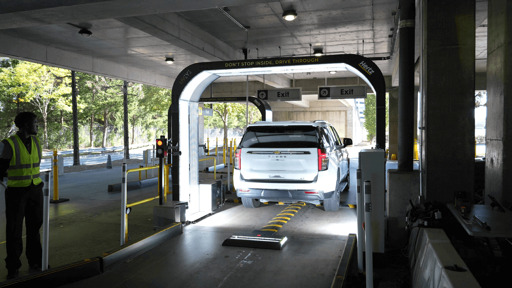Former GM Executive: BYD cars are good in terms of design, features, price, quality. If we let BYD into the U.S. market, it could end up destroying american manufacturers
-
Yes but after they win they have to raise prices...
Yes, and so may BYD. I have no idea what are you arguing for.
-
Good. Fuckem. They make shitty, oversized trucks that are a danger to pedestrians and people who drive reasonably sized cars anyway.
-
Where free market? It will regulate itself /s
Well China did subsidize that industry massively, to a point were their domestic market is flooded with very low margins. So the market is already very distorted. But I find it hard to hate on that because flooding the market with electric vehicles and solar panels is better than anything economists are coming up with.
-
I mean, what is the reason those Indian engineers chose the US over India?
and Trump is destroying all of it
The way things are going for you, nobody with a half a choice would decide to migrate to the USA for work
Adjust to your new reality pal
-
Six months ago I moved from the US to a country where BYD and other Chinese brands are available. In the past I owned GM cars. The former GM executive is correct. After trying Chinese cars I find it extremely difficult to justify paying 40-60% more for a car made by GM or anyone else. GM’s best selling cars here are made by its Chinese joint ventures and aren’t available for sale in the US, and they are the only GM cars I would buy.
They're pretty well known here for low quality flashy vehicles, with premiums for luxury not quality.
-
I am union so don’t misunderstand the comment, but doesn’t BYD rely heavily on terribly paid non-union labor to reach it’s price advantage?
No, it relies on massive automation. Similary their solar industry etc
For example

Automation, Not Cheap Labour, Drives China’s Solar and Battery Edge: Ritchie
A new analysis counters the “outdated” claim that China’s low solar panel and battery costs rely on cheap labour, pointing instead to automation and optimized production as the main drivers.
The Energy Mix (www.theenergymix.com)
-
China builds cars using massive government subsidies
The federal government ended the the EV subsidy a few years ago.
slave labor
lmao. We know what slavery looks like, you can see it in the cotton fields outside Angola Prison, rows of enslaved people, and overseer on a horse, all behind barbed wire. In Xinjiang I saw farmers driving combine harvesters in roadside fields.
local resources that arent available
You're getting closer. Through 1 and 5 year plans, the CPC uses SoEs (and sometimes just asks private companies "nicely") to ensure the foundational inputs, steel, rubber, chips, college graduates, etc are all available to industry at the specific price point and volume that competing private firms need to produce say, 100m EVs or a million more apartments.
Any country can do a little central planning to make sure private industry has what it needs, but this only works if you're able to take action against companies that exploit the system.
The federal government ended the the EV subsidy a few years ago.
Buyers of any EV not just American EVs.
lmao. We know what slavery looks like, you can see it in the cotton fields outside Angola Prison, rows of enslaved people, and overseer on a horse, all behind barbed wire.
I'm glad you find slavery so comical.
Were these inmates enslaved for their religious beliefs being different than the official party line? We they imprisoned for not wanting to be controlled by a dictatorship? No. No they weren't.
Through 1 and 5 year plans, the CPC uses SoEs (and sometimes just asks private companies "nicely") to ensure the foundational inputs, steel, rubber, chips, college graduates, etc are all available to industry at the specific price point and volume that competing private firms need to produce say, 100m EV or a million more apartments.
Gee, it sure sounds like you're listing even more slavery than I mentioned. Imagine Trump declaring that every college grad needs to make themselves available to build a border wall.
Any country can do a little central planning to make sure private industry has what it needs, but this only works if you're able to take action against companies that exploit the system.
The only exploitation mentioned here is the government exploiting the people. It seems your argument is based on your warped belief that if the US is committing atrocities than it's okay for everyone else to do so, yet your examples are in stark contrast to what's happening here. Your views are frankly quite disgusting and proof of how absurd the Chinese government's propaganda arm is.
-
I mean, didn’t Japanese and Korean automakers already do that?
Yes. They did. That's called competition. It forces companies to improve by destroying them, except they don't want that. And politicians don't want that, cause it makes corruption unstable.
Killed Detroit too, though. But, eh, helped other parts. It's life.
Thus already in the 90s with the TRON OS a different approach was chosen by US regulators - threaten Japan with sanctions if it's allowed to compete with Windows inside Japan .
They can't threaten China, but they can prevent Chinese competitive goods from entering US market and improving its economy again.
Bad economy - poor and stressed people, poor and stressed people - worse political decisions, worse political decisions - good for middlemen which in our age shouldn't exist frankly. We have the technologies for direct democracy, it's not 1920s.
-
Where free market? It will regulate itself /s
It will. It really does regulate itself, no /s needed.
Except that happens via some businesses going bankrupt and some adjusting.
And either it's free enough for monopolies to crash, or regulated enough for monopolies to be killed, or both.
If it's neither, then you have today's tech industry.
EDIT: And here the fears are that big companies will go down with their shareholders whining and their political cronies suffering and so on. Whether you want free market or literal socialism, the main problem is in separating private narrow interests from the state machine.
-
Even if they changed how would they win?
They're just too expensive to manufacture as compared to chinese ones.
If they are too expensive due to cost of labor, they can do, look at other comments, increased automation.
With automation China's advantages over US are mostly in the bureaucratic efficiency area. Both in the government's parts interacting with big companies and in the companies themselves.
US big companies are just too used to preferential treatment and solving market problems with lobbying, which worked when they were the spearhead of progress or something.
-
No, it relies on massive automation. Similary their solar industry etc
For example

Automation, Not Cheap Labour, Drives China’s Solar and Battery Edge: Ritchie
A new analysis counters the “outdated” claim that China’s low solar panel and battery costs rely on cheap labour, pointing instead to automation and optimized production as the main drivers.
The Energy Mix (www.theenergymix.com)
It brings up a valid point. Assembly line manufacturing will soon require massive automation lines to remain profitable, and without massive government assistance in not just money, but education and training, these kinds of automation factories will likely never be fully realized here.
-
the Chinese are really good at low cost manufacturing
They're not "good" at it, they just have no minimum wage and no semblance of annoying things like worker protections or unions to be concerned with.
China doesn't have a national minimum wage, but minimum wage is delegated to the local level there and definitely exists in every single province. Just echoing what the other user said, literally everything you said here is easily disprovable.
https://www.china-briefing.com/news/minimum-wages-China/ -
So here is the thing.
U lost. The moment I need American people to bail you out, you need to treat American people way way the fuck better.Worker rights, mandatory vacations, work protections, pensions, guaranteed healthcare etc.
Bailouts are unacceptable period. Trained workers, factories, factory hardware, logistics specialists, engineers, patents and so on - they all remain in the economy. That a company fails and goes bankrupt is not a bad thing. It's just that company. Not the industry as a whole. If there are no additional mechanisms.
Somehow Americans seem to have forgotten that the kind of "capitalism" which gets defended is about this exactly - a company goes bankrupt, too bad. There are other companies which will hire its workers and buy its assets. Possibly new companies created by its former employees. Its shareholders have gambled and lost, well, their problem. That's what an unregulated market is, by the way, and not bailouts to big fish and horse dicks for small fish.
If something works differently - workers don't find a new place to work in, factories go to scrap metal, engineers go flip burgers, patents are collected by trolls, and new companies are not being created, - then something has been broken by an existing policy.
Patents are the worst of it, but also non-compete clauses, legal impediments for creating new businesses, legal expenses making it harder, - these things have to be removed.
I mean, people on Lemmy love to dream of something like what you list, those things are good, but maybe fixing some basic things about what you already have is no less useful. Especially since these fixes do not cost any money to maintain, while, well, pensions and healthcare do.
-
If our CEOs and business leaders are supposedly the world's best, why didn't they spent their capital shutting China down instead of their lavish lifestyles and payouts for their wealthy stockholders? I guess they aren't as good at running businesses as they claim to be.
When the only goal by law is maximize profits, the motivation tends to favor minimizing cost. Change the rules, and enforce a new set of values. Only then will the situation improve.
-
Did Japan back then pay their assembly line workers the equivalent of $5k USD/year (in today's dollars) and have nearly no worker protections? Not a rhetorical question; I just don't know. Seems like Japan had a better standard of living back then compared to Chinese workers now, so I would guess their workers were compensated and treated better.
Not defending US auto corps (or any corp for that matter). The regulatory capture in the US is insane, and workers aren't treated as well as most of the rest of the first world.
Japan back then had (and still has) an interesting socioeconomic system, a bit similar to samurai clans went cartels, where workers are supposed to work all their life in one place (or close to that), don't squeal about worker rights and such, but be covered by lots of company-provided social nets and guarantees.
-
Japan used state capitalism to promote it’s auto industry and other key sectors to sustain strong growth. America’s weakened billionaire owned government system is just being strip mined into the ground. We won’t be able to compete in an economy that’s only product is wealth extraction because of our massive corruption.
Back then American industries were just complacent due to insufficient competition, and Japan's industrial development was a bit of a miracle (that "living in year 2000 since 1980s" joke).
-
Good. Fuckem. They make shitty, oversized trucks that are a danger to pedestrians and people who drive reasonably sized cars anyway.
My boss in the UK got one. In bright red. It looks like he's driving a fucking fire engine.
-
Oh no! The type of capitalism where we have to compete!
Make it go away, Daddy Trump!
-
When Americans of all political stripes finally wake up to global realty, they'll most likely do it lying on a sidewalk, naked in the rain, with their fingers in their ears saying na-na-na-na-na-na...
People will eventually have to face that the economic golden age of the 1950s and 60s wasn't a normal state we can return to if greedy billionaires just let us. The rich definitely grabbed the biggest share of the prosperity, but that brief era of prosperity wasn't normal, it was entirely abnormal, and it's been over for quite a while. We've been fooling ourselves and keeping it going for the last half century by living on credit, and that's about to end. I don't know what new era is about to start, but the American era is over.
That might be true, but also a certain revolutionary purging of world politics would do a lot to return to something close to that. The golden age happened after the world war and decolonization, when western countries were full of veterans, and laws governing their lives were much simpler.
Internet-assisted direct democracy, open borders, open trade, radical changes in patent laws, simpler laws generally - all this can exist.
We simply have too much legacy everywhere strangling development.
The bad guys are trying to make it appear that the only legacy that can be stripped is that of French revolution ideals, human rights and civilization. That actually we don't have to strip, that is all good. Just them.
It's normal. Sometimes humans need surgeries, and sometimes a part of an old building has to be dismantled - maybe there's a pipe in the wall that leaks, or maybe you need to retrieve a human skeleton found using some new technology, whatever. And you throw out garbage regularly.
So a reform for direct democracy (with ranked choice between variants having, say, 1000+ initial supporters in some incubator to get to the vote itself, because we have computers, storage and connectivity to make everything desirable for such) IMHO would go a long way to fixing half the problems in the world.
-
Yes. They did. That's called competition. It forces companies to improve by destroying them, except they don't want that. And politicians don't want that, cause it makes corruption unstable.
Killed Detroit too, though. But, eh, helped other parts. It's life.
Thus already in the 90s with the TRON OS a different approach was chosen by US regulators - threaten Japan with sanctions if it's allowed to compete with Windows inside Japan .
They can't threaten China, but they can prevent Chinese competitive goods from entering US market and improving its economy again.
Bad economy - poor and stressed people, poor and stressed people - worse political decisions, worse political decisions - good for middlemen which in our age shouldn't exist frankly. We have the technologies for direct democracy, it's not 1920s.
We have the technologies for direct democracy








